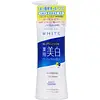What's inside
What's inside
 Key Ingredients
Key Ingredients

 Benefits
Benefits

 Concerns
Concerns

 Ingredients Side-by-side
Ingredients Side-by-side

Water
Skin ConditioningEthylhexyl Methoxycinnamate
UV AbsorberIsononyl Isononanoate
EmollientDimethicone
EmollientAlcohol Denat.
AntimicrobialButylene Glycol
HumectantPEG-12 Dimethicone
Skin ConditioningPentylene Glycol
Skin ConditioningPolysilicone-15
UV FilterGlycol Dimethacrylate Crosspolymer
Bis-Ethylhexyloxyphenol Methoxyphenyl Triazine
Skin ConditioningMagnesium Ascorbyl Phosphate
AntioxidantHydrolyzed Hyaluronic Acid
HumectantSodium Hyaluronate
HumectantDiethylamino Hydroxybenzoyl Hexyl Benzoate
UV FilterPolysilicone-13
Phenoxyethanol
PreservativeCarbomer
Emulsion StabilisingTriethanolamine
BufferingPolystyrene
Polyvinyl Alcohol
Hydroxyethylcellulose
Emulsion StabilisingDisodium EDTA
Iodopropynyl Butylcarbamate
PreservativeAcrylates/C10-30 Alkyl Acrylate Crosspolymer
Emulsion StabilisingTitanium Dioxide
Cosmetic ColorantAmmonium Acrylates Copolymer
Hydrated Silica
AbrasiveAluminum Hydroxide
EmollientHydrogen Dimethicone
Methylparaben
PreservativeWater, Ethylhexyl Methoxycinnamate, Isononyl Isononanoate, Dimethicone, Alcohol Denat., Butylene Glycol, PEG-12 Dimethicone, Pentylene Glycol, Polysilicone-15, Glycol Dimethacrylate Crosspolymer, Bis-Ethylhexyloxyphenol Methoxyphenyl Triazine, Magnesium Ascorbyl Phosphate, Hydrolyzed Hyaluronic Acid, Sodium Hyaluronate, Diethylamino Hydroxybenzoyl Hexyl Benzoate, Polysilicone-13, Phenoxyethanol, Carbomer, Triethanolamine, Polystyrene, Polyvinyl Alcohol, Hydroxyethylcellulose, Disodium EDTA, Iodopropynyl Butylcarbamate, Acrylates/C10-30 Alkyl Acrylate Crosspolymer, Titanium Dioxide, Ammonium Acrylates Copolymer, Hydrated Silica, Aluminum Hydroxide, Hydrogen Dimethicone, Methylparaben
Butylene Glycol
HumectantGlycerin
HumectantAscorbyl Glucoside
AntioxidantSodium Hyaluronate
HumectantMagnesium Ascorbyl Phosphate
AntioxidantRoyal Jelly Extract
Skin ConditioningSoluble Collagen
HumectantAcrylic Acid
Isohexadecane
EmollientDisodium EDTA
Polyvinylalcohol Crosspolymer
Squalane
EmollientPentaerythrityl Tetraethylhexanoate
EmollientPolyoxymethylene Melamine
Dimethicone
EmollientDisodium Phosphate
BufferingSodium Hydroxide
BufferingHydrogenated Phosphatidylcholine
EmulsifyingPhenoxyethanol
PreservativeMethylparaben
PreservativeButylene Glycol, Glycerin, Ascorbyl Glucoside, Sodium Hyaluronate, Magnesium Ascorbyl Phosphate, Royal Jelly Extract, Soluble Collagen, Acrylic Acid, Isohexadecane, Disodium EDTA, Polyvinylalcohol Crosspolymer, Squalane, Pentaerythrityl Tetraethylhexanoate, Polyoxymethylene Melamine, Dimethicone, Disodium Phosphate, Sodium Hydroxide, Hydrogenated Phosphatidylcholine, Phenoxyethanol, Methylparaben
 Reviews
Reviews

Ingredients Explained
These ingredients are found in both products.
Ingredients higher up in an ingredient list are typically present in a larger amount.
Butylene Glycol (or BG) is used within cosmetic products for a few different reasons:
Overall, Butylene Glycol is a safe and well-rounded ingredient that works well with other ingredients.
Though this ingredient works well with most skin types, some people with sensitive skin may experience a reaction such as allergic rashes, closed comedones, or itchiness.
Learn more about Butylene GlycolDimethicone is a type of synthetic silicone created from natural materials such as quartz.
What it does:
Dimethicone comes in different viscosities:
Depending on the viscosity, dimethicone has different properties.
Ingredients lists don't always show which type is used, so we recommend reaching out to the brand if you have questions about the viscosity.
This ingredient is unlikely to cause irritation because it does not get absorbed into skin. However, people with silicone allergies should be careful about using this ingredient.
Note: Dimethicone may contribute to pilling. This is because it is not oil or water soluble, so pilling may occur when layered with products. When mixed with heavy oils in a formula, the outcome is also quite greasy.
Learn more about DimethiconeDisodium EDTA plays a role in making products more stable by aiding other preservatives.
It is a chelating agent, meaning it neutralizes metal ions that may be found in a product.
Disodium EDTA is a salt of edetic acid and is found to be safe in cosmetic ingredients.
Learn more about Disodium EDTAMagnesium Ascorbyl Phosphate (MAP) is a form of Vitamin C and is an antioxidant. It can help to reduce redness, improve skin texture, reduce the effects of aging, reduce the visibility of dark spots, and brighten skin.
MAP is created by combining ascorbic acid with magnesium salt. While MAP more gentle on the skin than ascorbic acid, it is thought to be less easily-absorbed into the skin.
Due to MAP's stability up to a pH level of 7, it is more stable to air and sunlight exposure than ascorbic acid. The best pH range for MAP is between 5 and 6.
Like other forms of Vitamin C, MAP has been shown to help reduce hyperpigmentation and simulate collagen production.
As an antioxidant, it helps protect your skin against the signs of aging.
Learn more about Magnesium Ascorbyl PhosphateMethylparaben is a preservative and is a paraben. It is used to prevent the growth of fungus, mold, and other harmful bacteria. Parabens are chemicals used as preservatives in both cosmetics and food.
Methylparaben can be synthetically created. It can also be found naturally in some fruits, such as blueberries.
Oftentimes, Methylparaben is combined with other parabens to help increase the shelf life.
The safety of Methylparaben is currently being studied. While ongoing studies are looking into the safety of parabens, the results have been very mixed. Some studies have not found Methylparaben to be harmful.
Learn more about MethylparabenPhenoxyethanol is a preservative that has germicide, antimicrobial, and aromatic properties. Studies show that phenoxyethanol can prevent microbial growth. By itself, it has a scent that is similar to that of a rose.
It's often used in formulations along with Caprylyl Glycol to preserve the shelf life of products.
Sodium Hyaluronate is hyaluronic acid's salt form. It is commonly derived from the sodium salt of hyaluronic acid.
Like hyaluronic acid, it is great at holding water and acts as a humectant. This makes it a great skin hydrating ingredient.
Sodium Hyaluronate is naturally occurring in our bodies and is mostly found in eye fluid and joints.
These are some other common types of Hyaluronic Acid:
Learn more about Sodium Hyaluronate